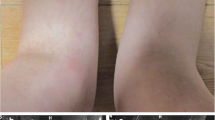Abstract
Muckle-Wells syndrome (MWS) is a rare autoinflammatory disease. This study aimed to report the clinical features and gene variations of the first case series of MWS patients in Chinese population. Four Han Chinese patients were diagnosed with MWS and followed up at our adult clinic for autoinflammatory diseases. All relevant phenotypes and genotypes were collected. All patients were adult male. The median age of disease onset was 4.5 years, and one patient had adult-onset disease. No positive family history was observed. All patients had a remittent disease course. The duration of fever attacks ranged from 0.5 to 7 days. Skin rashes were present in all patients. The other manifestations included polyarthralgia/arthritis (n = 3), oral ulcers (n = 2), conjunctivitis (n = 2), myalgia (n = 2), headache (n = 2), pharyngitis (n = 1), abdominal pain (n = 1), severe sensorineural hearing loss (n = 1), and chronic meningitis with communicating hydrocephalus (n = 1). None of the patients showed evidence of renal amyloidosis. Each patient carried a heterozygous mutation in an NLRP3 gene, including D29V, V70M, T348M, and Q703K, respectively. D29V and V70M variants were novel mutations in exon 1 of NLRP3. All patients had good response to corticosteroids. Our study suggests that MWS could be identified in Chinese population. Our finding of novel mutations in NLRP3 may expand the diversity of MWS.

Similar content being viewed by others
References
Hawkins PN, Lachmann HJ, Aganna E, McDermott MF (2004) Spectrum of clinical features in Muckle-Wells syndrome and response to anakinra. Arthritis Rheum 50:607–612
Kümmerle-Deschner JB, Tyrrell PN, Reess F, Kötter I, Lohse P, Girschick H et al (2010) Risk factors for severe Muckle-Wells syndrome. Arthritis Rheum 62(12):3783–3791
Nakagawa K, Gonzalez-Roca E, Souto A, Kawai T, Umebayashi H, Campistol JM et al (2015) Somatic NLRP3 mosaicism in Muckle-Wells syndrome. A genetic mechanism shared by different phenotypes of cryopyrin-associated periodic syndromes. Ann Rheum Dis 74:603–610
Levy R, Gérard L, Kuemmerle-Deschner J, Lachmann HJ, Koné-Paut I, Cantarini L et al (2015) Phenotypic and genotypic characteristics of cryopyrin-associated periodic syndrome: a series of 136 patients from the Eurofever Registry. Ann Rheum Dis 74:2043–2049
Kuemmerle-Deschner JB, Dembi SS, Tyrrell PN, Koné-Paut I, Marie I, Deschner N et al (2014) Challenges in diagnosing Muckle-Wells syndrome: identifying two distinct phenotypes. Arthritis Care Res (Hoboken) 66:765–772
Kuemmerle-Deschner JB, Koitschev A, Ummenhofer K, Hansmann S, Plontke SK, Koitschev C et al (2013) Hearing loss in Muckle-Wells syndrome. Arthritis Rheum 65:824–831
Kuemmerle-Deschner JB, Tyrrell PN, Koetter I, Wittkowski H, Bialkowski A, Tzaribachev N et al (2011) Efficacy and safety of anakinra therapy in pediatric and adult patients with the autoinflammatory Muckle-Wells syndrome. Arthritis Rheum 63:840–849
Sarrabay G, Grandemange S, Touitou I (2015) Diagnosis of cryopyrin-associated periodic syndrome: challenges, recommendations and emerging concepts. Expert Rev Clin Immunol 11:827–835
Cuisset L, Jeru I, Dumont B, Fabre A, Cochet E, Le Bozec J et al (2011) Mutations in the autoinflammatory cryopyrin-associated periodic syndrome gene: epidemiological study and lessons from eight years of genetic analysis in France. Ann Rheum Dis 70:495–499
Hernández-Rodríguez J, Ruíz-Ortiz E, Tomé A, Espinosa G, González-Roca E, Mensa-Vilaró A et al (2016) Clinical and genetic characterization of the autoinflammatory diseases diagnosed in an adult reference center. Autoimmun Rev 15:9–15
Ter HNM, Oswald M, Jeyaratnam J, Anton J, Barron KS, Brogan PA et al (2015) Recommendations for the management of autoinflammatory diseases. Ann Rheum Dis 74:1636–1644
Lv QW, Zhang W, Shi Q, Zheng WJ, Li X, Chen H et al (2015) Comparison of Tripterygium wilfordii Hook F with methotrexate in the treatment of active rheumatoid arthritis (TRIFRA): a randomised, controlled clinical trial. Ann Rheum Dis 74:1078–1086
Vitale A, Lucherini OM, Galeazzi M, Frediani B, Cantarini L (2012) Long-term clinical course of patients carrying the Q703K mutation in the NLRP3 gene: a case series. Clin Exp Rheumatol 30:943–946
Author information
Authors and Affiliations
Corresponding author
Ethics declarations
Disclosures
None.
Funding
This work was supported by the National Natural Science Foundation of China (Grant No. 81501405) and the Youth Research Funds of Peking Union Medical College (Grant No. 3332015092).
Rights and permissions
About this article
Cite this article
Wu, D., Shen, M. Muckle-Wells syndrome in Chinese patients: a single center case series. Clin Rheumatol 36, 965–969 (2017). https://doi.org/10.1007/s10067-016-3523-3
Received:
Accepted:
Published:
Issue Date:
DOI: https://doi.org/10.1007/s10067-016-3523-3




